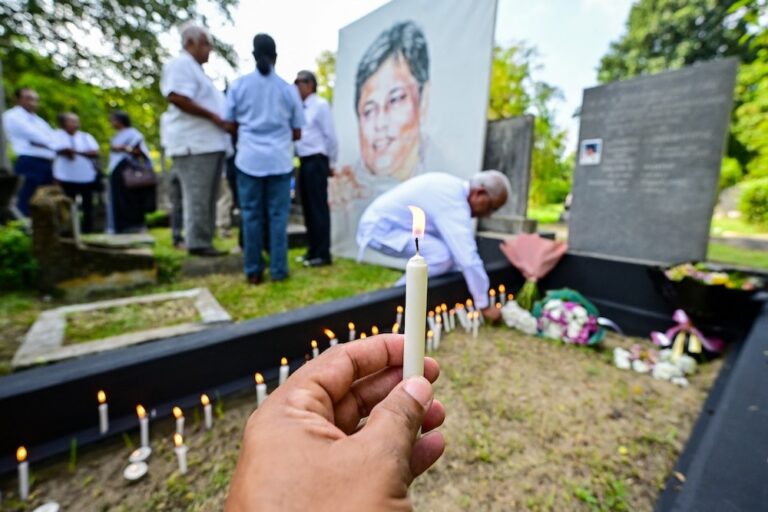Most of the Sri Lankan media have not sent reporters to the Tamil areas. The press have only managed to get into these areas when there have been visits by Sri Lankan and international officials.
(RSF/IFEX) – Reporters Without Borders is extremely worried about the statements made by Sri Lankan officials, including army commander Gen. Sarath Fonseka, that journalists who visited areas formerly controlled by the Tamil Tiger rebels will be prosecuted.
At the same time, access to refugee camps and Tamil areas in general is still severely regulated, preventing the press from obtaining information about the fate of the Tamil population. Journalists and witnesses who dared to speak out have been intimidated and arrested.
“The war is over,” Reporters Without Borders said. “There is no longer any reason for the army to impose so many restrictions on media working in the Tamil areas, including restrictions on access to refugee camps. The United Nations – which deliberately minimised the suffering of Tamil civilians, according to the French newspaper ‘Le Monde’ – should make an effort to obtain unrestricted access to refugee camps for the press and humanitarian aid workers.”
A humanitarian aid worker said: “At the checkpoints installed on the roads leading to Tamil areas, soldiers always ask the same question: ‘What are you going to do there?'” Journalists are turned back if they lack official authorisation. The few foreign journalists who have covered the Tamil camps have been targeted by the government. A TV crew working for Britain’s Channel 4 was expelled.
Most of the Sri Lankan media have not sent reporters to the Tamil areas. The press have only managed to get into these areas when there have been visits by Sri Lankan and international officials such as UN secretary-general Ban Ki-moon. The International Committee of the Red Cross (ICRC) has not been allowed to visit some detention camps.
Reporters Without Borders also reiterates its call for the release of three Tamil doctors – Thangamuttu Sathiyamorthi, Thurairaja Varatharajan and V. Sunmugarajah – who have been held since 18 May 2009 for providing the international media with information about the humanitarian situation in the Vanni district. ICRC representatives were allowed to see them in Colombo.
The army is trying to identify Tamils who provided information to the foreign press. A humanitarian aid worker who visited a camp near Vavuniya told Reporters Without Borders that members of Tamil paramilitary groups have been infiltrated into some camps with the aim of identifying those who are trying to get their stories to the media.
The army recently blocked the arrival of several dozen nuns who had obtained health ministry permission to visit camps to help refugees, especially those who have been psychologically traumatised.
Reporters Without Borders also condemns the way Vavuniya-based journalist Mahamuni Subramaniam, a stringer for various news media including Reuters, has been treated. He was arrested on 14 May while covering the justice minister’s visit to the Ramanathan refugee camp.
Claiming that only journalists with the ITN and Rupavahini TV stations were allowed to film or take pictures of the minister’s meeting with a general, the police confiscated his expensive camera and still have not returned it to him, although he has petitioned the High Court for its return.
“During these inquiries once Major General Chandrasiri came out and verbally abused me saying I am a LTTE suspect and ordered the military to check me thoroughly. When I claimed that I am a reporter for Reuters, he vehemently said all foreign journalists are working against his homeland”, Subramaniam said in a letter.
A report published in “Le Monde” on 28 May accused the United Nations, especially the secretary-general’s chief of staff, Vijay Nambiar, of deliberately playing down the number of Tamil casualties during the fighting so as not to anger the government and thereby jeopardise the UN’s ability to continue operating in the country. An estimated 20,000 Tamils died in the fighting.
A resolution adopted by the UN Human Rights Council in Geneva on 27 May praising the Sri Lankan government was an insult to the Tamil victims, Reporters Without Borders added.


